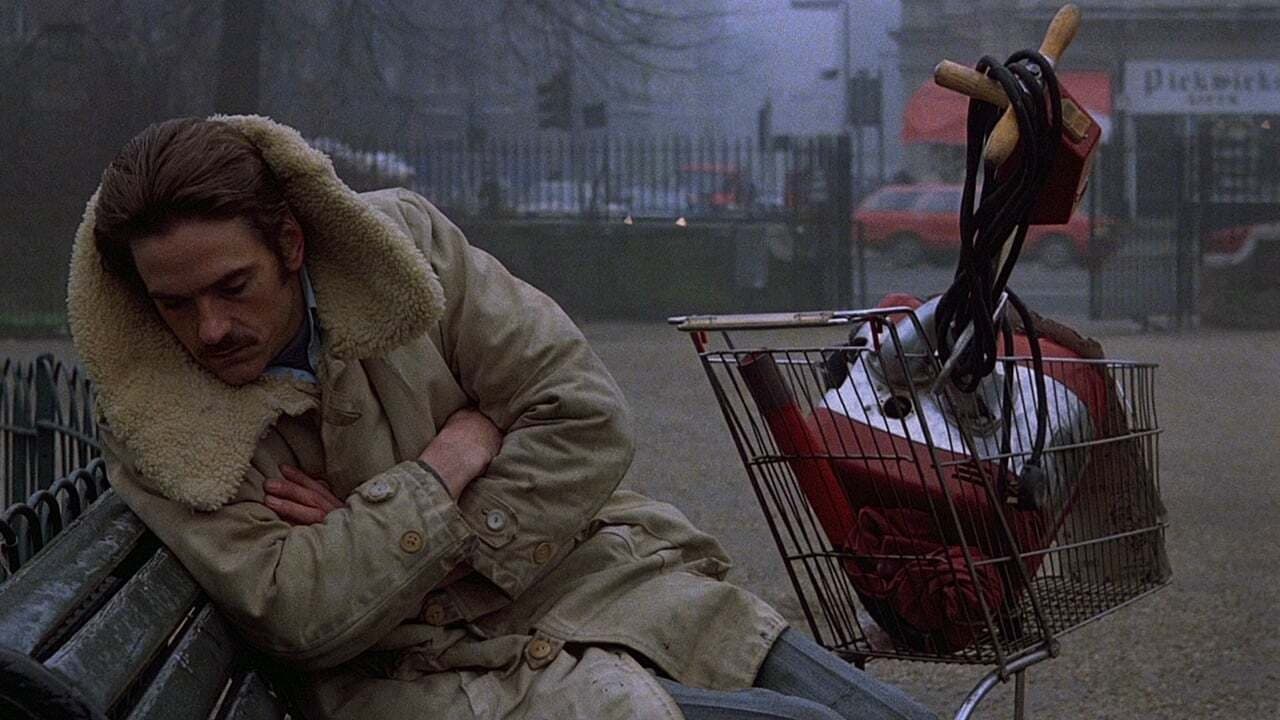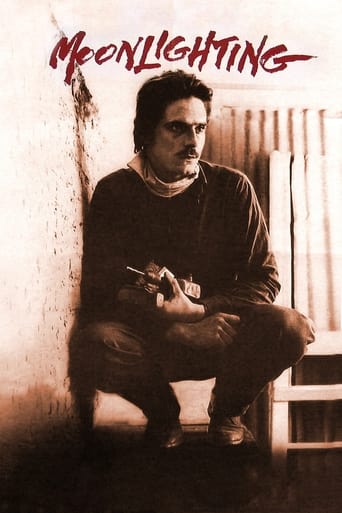Tetrady
not as good as all the hype
Stellead
Don't listen to the Hype. It's awful
Lancoor
A very feeble attempt at affirmatie action
Billie Morin
This movie feels like it was made purely to piss off people who want good shows
dglink
Led by Nowak, the only member of the group with minimal English skills, four Polish contractors arrive in London to gut and refurbish a row house that belongs to their boss back in Warsaw. Heavily laden with tools and carrying only enough cash for materials, bare living expenses, and little entertainment, the four face separation from family and an often hostile English environment. However, the money earned will go a long way in Poland, and their boss will have a renovated London flat at a quarter the cost of using English labor.Written and directed by Polish playwright Jerzy Skolimowski, "Moonlighting" is a low key film that focuses on the interaction among the four isolated men, who live, work, and sleep in the flat. Nowak, Jeremy Irons in a quiet understated performance, is the only one to regularly venture outside to find food and building materials. Faced with dwindling funds, Nowak devises various methods to shoplift goods or outwit store managers and cleverly double his grocery purchases. While sheer luck often aids Nowak with his dodgy schemes, the English shopkeepers seem remarkably dim, and the immigration officer on arrival at Heathrow was unbelievably gullible.The story takes place in 1981, the year the film was shot, and, while Nowak struggles with finances and an approaching deadline, Poland stumbles into a military coup, and martial law is imposed. With phone lines cut between London and Warsaw and all flights to Poland canceled, Nowak must conceal the events unfolding at home from his compatriots to keep them focused on finishing the flat. Because three of the four principal actors have few lines and those only in Polish, the film concentrates on Irons, who ably carries the film. Although much of the action takes place inside the flat, Skolimowski's direction manages to avoid a claustrophobic feel. However, "Moonlighting's" leisurely pace does require patience. But Nowak's sharp wits and audacity, fueled by his determination to complete the assigned task despite the mounting odds, make for engrossing viewing. Skolimowski's "Moonlighting" is a small, overlooked film with many rewards for discerning viewers to discover.
FilmCriticLalitRao
Moonlighting is an outstanding Polish film which deserves to be listed among top 100 world cinema films.It is a film which shows us that there are some cruel,inhuman,unjust political systems and political establishments who constantly deprive common people of earning their respective livelihoods.Moonlighting demonstrates that human life is full of misery as it can make somebody do things which one would normally not do in daily life.This is the case of a Polish foreman Novak who is in London with three construction workers known to him. For them,their work site appears more of a prison as they cannot go out.Skolimowski is as critical of the plight of clandestine workers as that of Polish government's decision to declare Martial Law.It is sad to learn that according to moonlighting some workers had to work for 18 hours a day.Anxiety,apprehension and confusion are immediately palpable to these people who have landed in London for earning extra money.For example :an airport scene shows Polish workers to be entirely dependent on Novak as he is the only person who speaks English.Touching too are the scenes in which Novak pilfers from a neighborhood supermarket.A word about Sir Jeremy Irons.He is a joy to watch as nobody expected him to play the role of Nowak with amazing inventiveness.
Parakh007
You can't expect anything, but to scream, every time Jeremy Irons character shoplifts. Every time the director, makes you believe that he is going to get caught now, but he gets out easily.I never felt so sympathetic towards any fictional character, as I felt for him, especially a character who is ripping every one off.And the director, without any close ups, screams the hell out of you.Its real horror, you wann shut your eyes, but still want to know, what happens next.Will he get out of country or not? And hands down,best movie ending ever.Please give it a watch.I have never left a comment for any flick, but after watching this one, and the poor response towards this Cinematic classic, I urge you, nope beg you, to please see it. U can't miss this one if you call yourself a die hard movie buff
Syl
The story is told by Novak's point of view. Jeremy Irons learns his Polish to play Novak in this story. He is a Polish electrician traveling with three other works to London, England before martial law was enacted in Poland in 1981. Well, anyway as a Polish American, they are believable but are seen as buffoonish and dumb even by Novak himself. If Novak had told his workers the truth, I think they would have gotten along or understood their dire consequences. Jeremy Irons gives a pretty believable performance as the working Polishman. This film resonates a quarter of a century later because many Polish men and women are legally in London and England seeking to better themselves. I understand the Polish mentality because I grew up with Polish immigrants and the notion of Poles coming just to work and earn more money in America. I could see this story actually happening but I don't think they give the other workers credit because we barely see them act as anything other than fools. It's kind of heartbreaking because Novak goes to so much trouble to spare them from the lack of money and the truth of the situation back home in Poland where he is the only one who knows only what's going on but doesn't tell his employees under his command that Poland is in political turmoil. You can't help but wonder what happens when they do go home. Can you imagine walking 6 hours to Heathrow Airport? You felt pity and foolishness for Novak's actions at the supermarket and the stores. Of course, Poles are good at surviving and I know this from my personal experience. They have survived 2 World Wars and communism. Poles' biggest problem is living and to stop worrying about money. The stereotypes of Poles like Novak trying to stretch each pence is to survive nothing more. They didn't complain about the 30 miles to Heathrow. You felt that they were out of place there. Novak wondered about his wife, Anna, and the possibility that she was probably being seduced by his employer who sent him to London in the first place to fix up the apartment. With telephone services cut down and money tight, Novak does everything he can to protect himself and his men from the dangers of the police, immigration, and even Polish government under martial law. We don't know what happens to them when they go home or if they ever do or if they are stranded in London. There are still many unanswered questions about their predicament.

